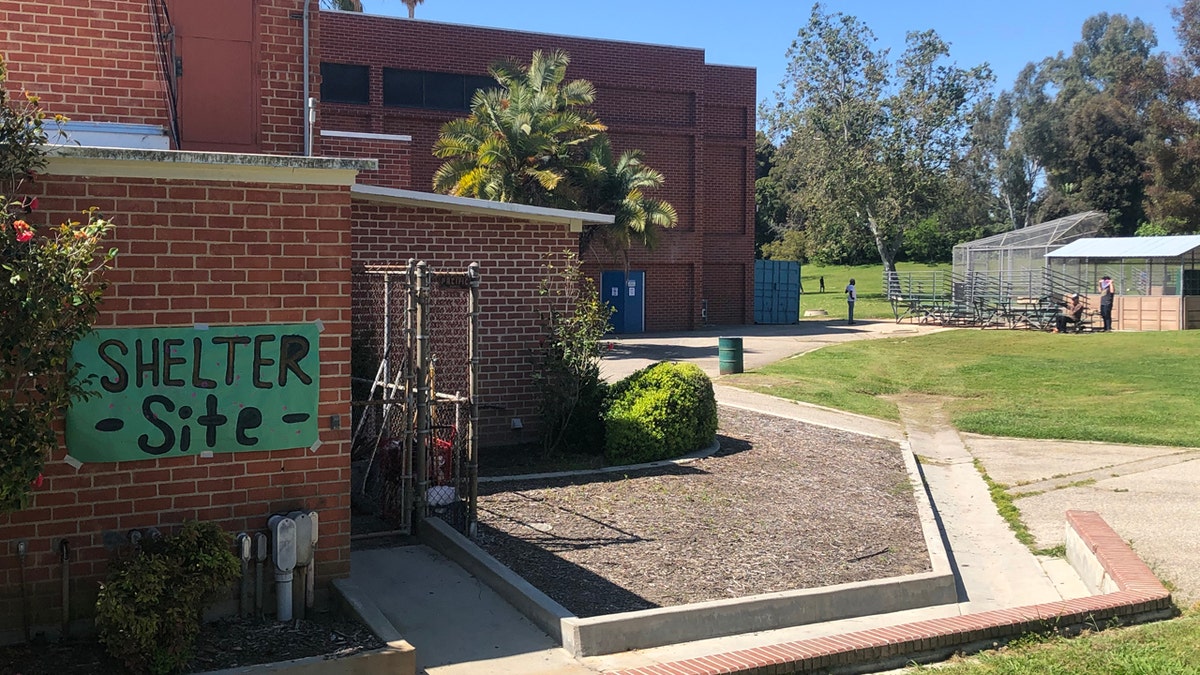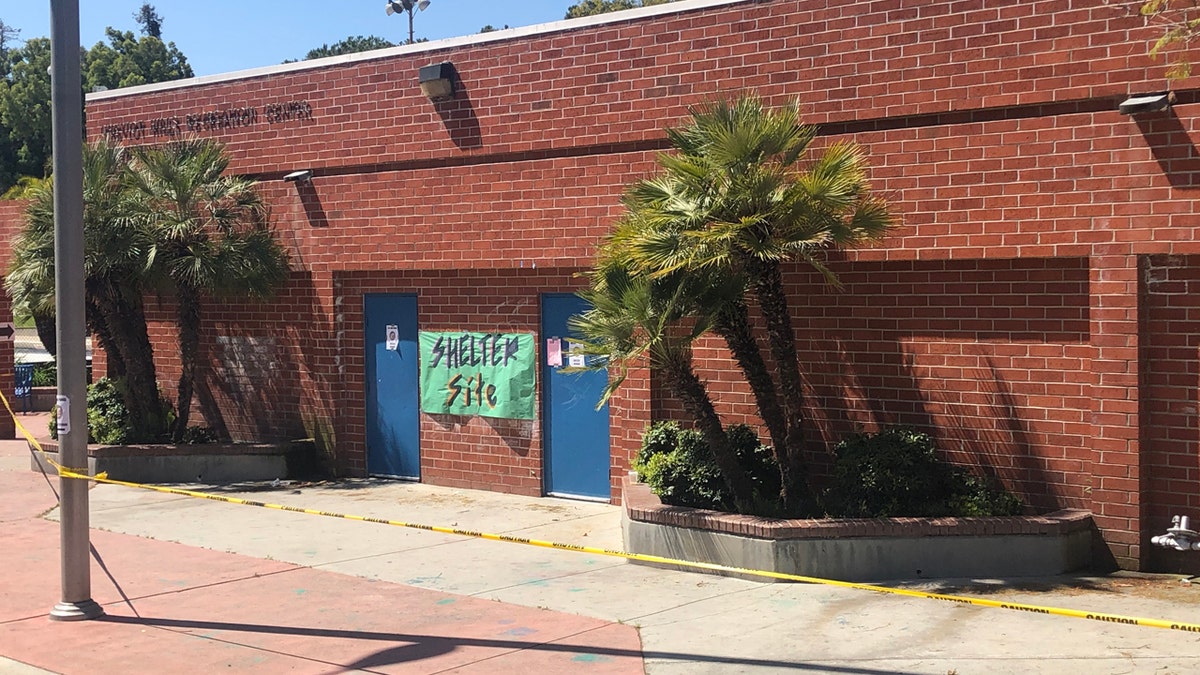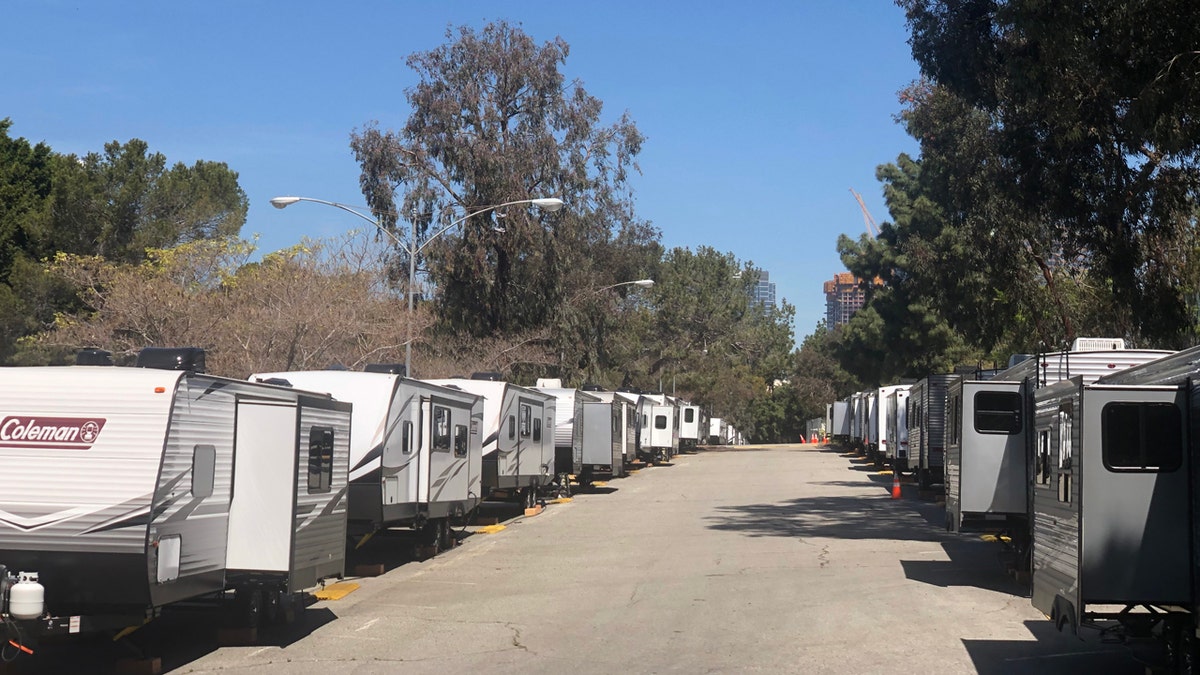Fox News Flash top headlines for April 22
Fox News Flash top headlines are here. Check out what's clicking on Foxnews.com.
Get all the latest news on coronavirus and more delivered daily to your inbox. Sign up here.
LOS ANGELES -- The Cheviot Hills Recreation Center is a rolling greenspace bordering the tiny Hillcrest Country Club and the sprawling Fox Studio Lot in the densely-packed Rancho Park neighborhood on Los Angeles’ Westside.
In normal times, the center is home to countless local baseball leagues, a tennis center, an archery range and even a club for the French lawn bowling sport of pétanque. But as city and state officials try to battle the spread of the coronavirus throughout Southern California, the center has become the temporary home for dozens of homeless individuals that local lawmakers want off the streets.
Multi-colored cots are lined up 6 feet apart along the center’s indoor basketball court while homeless residents are free to move about inside and outside of the facility-- provided they maintain proper social distancing. The center’s massive parking lot has been fenced off and converted into an RV park with dozens of gleaming, brand-new trailers waiting to house any homeless residents who become sick with COVID-19.
The temporary shelter at the Cheviot Hills Recreation Center is not unique in Los Angeles, as the city has set up 20 temporary housing facilities for the homeless across the sprawl of the United States' second-largest city since the start of the coronavirus outbreak, with at least four more planned.
PHOTOS: EMPTY STREETS AMID CORONAVIRUS FEARS IN US CITIES
The plan of moving the homeless into large open congregate shelters during the pandemic, however, has drawn widespread criticism from homeless advocates and public health experts who say these places could become breeding grounds for the contagion to spread like wildfire, and also from some residents fearful that a positive case of COVID-19 at a center could endanger the local population.
“If COVID-19 infects one homeless person living in this newly created RV Park, it will spread quickly and exponentially, putting our neighborhood at high risk of spreading the virus,” Jessica Brown, a Rancho Park resident, wrote in a Change.org petition she started to get Los Angeles Mayor Eric Garcetti to move the temporary shelter.
Brown added: “It is naive and dangerous to think that sheltering hundreds of homeless people (who could be potentially infected with COVID-19 already) in our neighborhood park is a safe solution to the housing crisis during this time.”

The homeless shelter at the Cheviot Hills Recreation Center in Los Angeles sits next to baseball fields and a park popular with walkers. (Andrew O'Reilly/Fox News)
While Garcetti originally hoped to put the nearly 60,000 homeless people in Los Angeles County into hotel rooms during the public health crisis, city and county officials have since downsized that number to 15,000 and focused on getting homeless seniors and medically fragile people into hotels with others now being sent to the temporary shelters.
On Monday, Garcetti appeared cautiously optimistic about the plan, saying that all 20 facilities are currently 97 percent occupied and that so far there have been no reported coronavirus outbreaks. In total, the temporary shelters, which hold far fewer people than permanent homeless shelters, will have around 1,000 beds -- far less than the 6,000 initially planned for.
“It is working exactly how we hoped it would,” he said. “And I’ve always said too that doesn’t mean that we will never have cases, but we haven’t yet had large-scale outbreaks.”
CLICK FOR COMPLETE COVERAGE OF THE CORONAVIRUS OUTBREAK
Despite Garcetti’s optimism, public health experts have expressed grave concerns about putting homeless individuals inside open congregate shelters -- no matter how far the beds are spaced -- during the pandemic and point to outbreaks of the virus in other shelters across the state as evidence for their trepidations.
Already, 55 residents and three staff members at the Union Rescue Mission in Los Angeles’ infamous Skid Row neighborhood have tested positive for the coronavirus, while in San Francisco about 100 homeless people and 10 staffers tested positive at that city’s largest shelter.

The outside of the Cheviot Hills Recreation Center in Los Angeles. (Andrew O'Reilly Fox News)
“I had a vivid nightmare of this happening,” Chris Herring, a sociology doctoral candidate at UC Berkeley who is assisting the San Francisco Coalition on Homelessness, told the Los Angeles Times. “Now that we’re learning more and how it keeps going worse, it just sounds like a nasty experiment that we’re doing with a group of people that we wouldn’t do ever with another group of people.”
Los Angeles is not the only city where officials are hoping that moving homeless people into large open congregate shelters will protect them from COVID-19.
CLICK HERE FOR THE FOX NEWS APP
California is home to half of the country’s street homeless population -- about 151,000 people in all -- and state and local lawmakers have already thrown billions of dollars trying to tackle the mounting issue of homelessness. The coronavirus pandemic has created an even greater sense of urgency to get people off the streets, but also out of crowded shelters where the pathogen could easily spread.
Earlier this month, San Diego officials moved more than 800 people out of a large shelter and into the city’s convention center. San Diego Mayor Kevin Faulconer said the convention center could eventually house up to 1,500 homeless individuals.

Trailers at the Cheviot Hills Recreation Center in Los Angeles will be used to house any homeless people who become sick with COVID-19. (Andrew O'Reilly/Fox News)
While living conditions at the center will be less cramped than in shelters, some homeless outreach workers echoed the worries of their colleagues up in Los Angeles that even one positive case of COVID-19 could wreak havoc on the people staying on the convention center’s floor.
“Bewildering is just one adjective to use to describe putting a thousand souls in an open congregate shelter like this during a public health crisis,” Chris Megison, the founder of the homeless outreach organization Solutions for Change, told Fox News. “It’s a powder keg in there.”
Megison added: “We are all are hoping and praying that nobody dies, but if somebody does die its involuntary manslaughter as far as we’re concerned because this is irresponsible.”













































